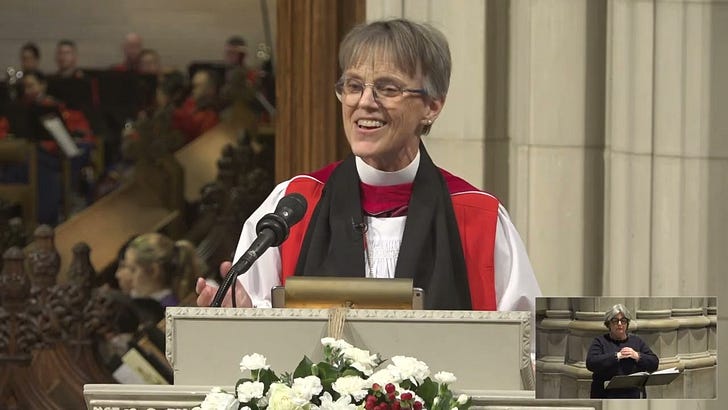In 1944, George Bell, the Bishop of Chichester in the Church of England, gave a speech in the House of Lords condemning the carpet bombing of Germany by the Royal Air Force.
Do the Government understand the full force of what area bombardment is doing and is destroying now? Are they alive not only to the vastness of the material damage, much of which is irreparable, but also to the harvest they are laying up for the future relationships of the peoples of Europe as well as to its moral implications?… There must be a fair balance between the means employed and the purpose achieved. To obliterate a whole town because certain portions contain military and industrial establishments is to reject the balance.
In quite the stroke of timing, that speech is part of the assigned readings for my Anglican History and Theology class this very week and I was re-reading it yesterday when I saw news of Mariann Budde’s sermon at the prayer service at the National Cathedral in which she directly implored Donald Trump to “have mercy” on those who are scared because of his policies.
I have students read George Bell’s speech because it is a valuable exercise in Anglican ethics but primarily as part of a broader discussion about what you might call the “ethos” of establishment in England. Any religious leader in England could have criticized the government’s campaign. Bell had the platform of the House of Lords to speak directly to representatives of the government and the press because as a senior bishop in the Church of England he was also a member of the House of Lords.
Likewise, any religious leader in the United States can (and many have and will) criticize Donald Trump and implore him to change direction. Only one, however, was the bishop of a cathedral that traditionally hosts state events and so had the opportunity to speak directly to him, the press, and the public.
The United States does not (and constitutionally cannot) have an established church. But the Episcopal Church has long held to a “national church ideal” where it thinks it can style itself as the conscience of the nation. In class we discuss the many downsides of establishment as well: how it can “inoculate people against the gospel”; how it can distract the church from other priorities; how it can lead to far too close a relationship between church and state. What I see in George Bell and Mariann Budde is the skillful use of the position of the church to convey unpopular but necessary truths. We should not underestimate how difficult this is. I think of the line I think I heard from Desmond Tutu who when asked how he managed to say something direct and confrontational to those in power during the anti-apartheid struggle said something like, “I was shaking in my boots the whole time I was speaking,” and I think we can see a bit of this in the video of Bishop Budde. God bless her.
One final note: George Bell suffered consequences because of his speech. It is widely believed that Winston Churchill passed him over for Archbishop of Canterbury later that year because of Churchill’s fury at this speech. The full extent of the consequences for Bishop Budde are not clear, though Trump has already expressed his displeasure on social media. It is the uncomfortable truth that those who speak prophetically often are made to bear the costs for this speech. Bishop Budde will need all the support and encouragement she can get in the coming days.
What I wrote: This isn’t exactly writing but I was recently on the Spade Spoon Soul podcast to discuss my latest book, Faithful, Creative, Hopeful: Fifteen Theses for Christians in a Crisis-Shaped World, with a particular focus on those theses related to food and gardening. As a long-time listener, I was delighted to be a guest!
What I’m reading: Well, all of the above: speeches from the House of Lords, etc. But also Percival Everett’s James. Still early pages yet, but I’m into it.



